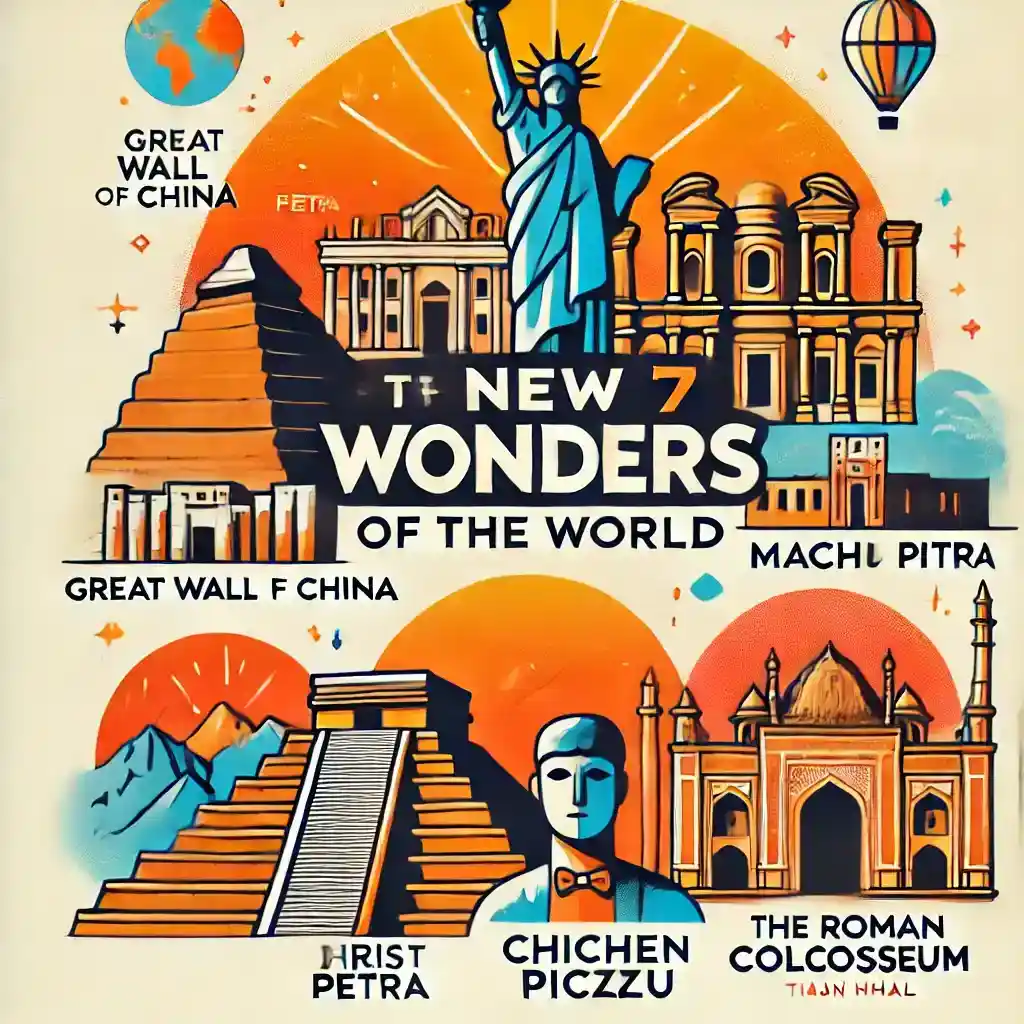The New Seven Wonders of the World represent some of the most remarkable achievements in architecture, culture, and history. This prestigious list was compiled through a global poll conducted in 2007 by the New7Wonders Foundation. Each of these sites tells a unique story, blending human creativity with natural and historical significance. In this article, we will explore these wonders, their fascinating histories, and what makes them so special.
Introduction to the New Seven Wonders of the World
1. What Are the New Seven Wonders?
The New Seven Wonders of the World are modern-day monuments selected to showcase the extraordinary achievements of humanity. These landmarks span continents and centuries, reflecting the diverse cultures, histories, and talents of civilizations across the globe. Unlike the original Seven Wonders of the Ancient World, most of which no longer exist, these modern wonders remain accessible and awe-inspiring.
2. How Were They Selected?
The selection process was conducted through an international poll organized by the New7Wonders Foundation. Millions of people participated, voting for their favorite monuments from a list of 200 candidates. The final seven were chosen based on their historical, architectural, and cultural significance.
3. A Modern Celebration of Human Achievement
The list celebrates humanity's ability to create extraordinary structures that withstand the test of time. From ancient temples to modern cities, these wonders remind us of our shared heritage and the power of creativity.
Exploring the New Seven Wonders of the World
1. The Great Wall of China
Location: China
Built: 7th century BCE to 17th century CE
The Great Wall of China stretches over 21,000 kilometers, making it the longest man-made structure in the world. Originally constructed to protect China from invasions, the wall also served as a symbol of power and unity. Today, it is a testament to ancient engineering and human determination.
2. Petra
Location: Jordan
Built: 312 BCE
Known as the "Rose City" due to its pink sandstone cliffs, Petra was the capital of the Nabataean Kingdom. This ancient city is famous for its intricate rock-cut architecture and sophisticated water management systems. Visitors often marvel at the Treasury, a monumental tomb carved into the rock.
3. Christ the Redeemer
Location: Rio de Janeiro, Brazil
Built: 1931
Standing 30 meters tall, Christ the Redeemer overlooks the city of Rio de Janeiro. This Art Deco statue is a symbol of Christianity and a global icon of peace and hospitality. Its location atop Mount Corcovado offers breathtaking views of the city and surrounding landscapes.
4. Machu Picchu
Location: Peru
Built: 15th century
Machu Picchu is a 15th-century Inca citadel nestled in the Andes Mountains. Often referred to as the "Lost City of the Incas," it is celebrated for its advanced engineering, agricultural terraces, and stunning mountain scenery. The site remains a mystery, with historians debating its original purpose.
5. Chichen Itza
Location: Yucatán, Mexico
Built: 600 CE to 1200 CE
Chichen Itza is a Mayan city renowned for its architectural and astronomical achievements. The Kukulkan Pyramid, also known as El Castillo, is a focal point of the site. During the equinoxes, shadows create the illusion of a serpent slithering down the pyramid's steps, showcasing the Mayans' advanced knowledge of astronomy.
6. The Colosseum
Location: Rome, Italy
Built: 70 CE to 80 CE
The Colosseum is an iconic symbol of Ancient Rome, where gladiatorial battles, animal hunts, and public spectacles took place. With a seating capacity of 50,000, it remains a testament to Roman engineering and architectural prowess. Today, it stands as a monument to Rome's cultural legacy.
7. The Taj Mahal
Location: Agra, India
Built: 1632 to 1653
The Taj Mahal is a stunning white marble mausoleum built by Emperor Shah Jahan in memory of his wife Mumtaz Mahal. This UNESCO World Heritage Site is considered a masterpiece of Mughal architecture, symbolizing eternal love and devotion. Its intricate carvings, gardens, and reflective pool leave visitors in awe.
Why These Wonders Matter
1. Cultural Significance
Each of these wonders represents the culture and history of its region, offering insights into the civilizations that built them. They are not just monuments; they are stories of triumph, struggle, and creativity.
2. Tourism and Global Connection
These wonders attract millions of tourists annually, promoting cross-cultural understanding and appreciation. They serve as a bridge between the past and the present, uniting people from around the world.
3. Inspiration for Future Generations
The New Seven Wonders inspire us to dream big and appreciate the achievements of humanity. They remind us that with vision and determination, extraordinary feats are possible.
Preserving the Wonders for Future Generations
1. Challenges Facing These Sites
Despite their magnificence, these wonders face threats such as pollution, climate change, and over-tourism. Preserving them requires global cooperation and sustainable practices.
2. Conservation Efforts
Governments, organizations, and local communities are working tirelessly to protect these sites. Efforts include restoration projects, regulated tourism, and raising awareness about their cultural value.
3. How We Can Contribute
As visitors, we can contribute by practicing responsible tourism. Simple actions like following guidelines, respecting local customs, and supporting conservation initiatives can make a big difference.
The Enduring Legacy of the New Seven Wonders
The New Seven Wonders of the World stand as a testament to humanity's ability to create beauty and meaning in the world. From the ancient mysteries of Petra to the architectural brilliance of the Taj Mahal, these sites remind us of our shared heritage and the limitless possibilities of human creativity. Visiting these wonders is more than just a travel experience; it is a journey through time, culture, and inspiration.



